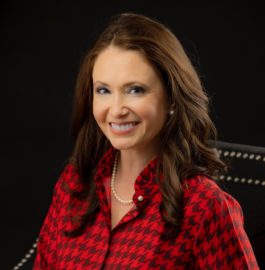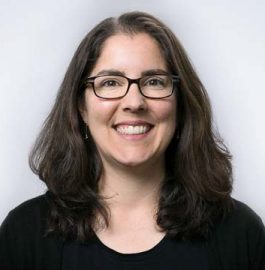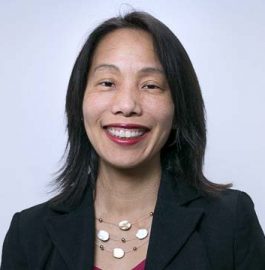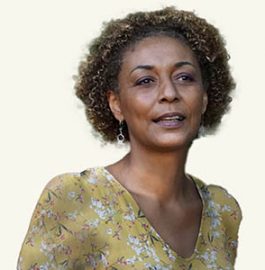Alana Barton
Media Technical Advisor

March 21, 2019
Media Technical Advisor
Family Planning, Maternal and Reproductive Health Gender Issues
Des femmes journalistes expérimentées de l’Afrique de l’Ouest sont invitées à participer à un atelier régional sur le rôle important des leaders religieux dans la promotion de la santé de la reproduction et du bien-être des femmes et des familles.
Le Population Reference Bureau (PRB) lance un appel à candidatures pour son programme de formation « Women’s Edition » en l’Afrique de l’Ouest. « Women’s Edition » réunit des femmes journalistes de haut niveau–rédacteurs en chef, chefs de desks, journalistes et productrices– pour des séminaires d’une semaine consacrés à des sujets liés à la santé de la reproduction et aux questions de population et de développement.
Le séminaire aura lieu à Dakar (Sénégal) en juin 2019 et portera sur l’engagement des chefs religieux de la région ouest africaine dans la promotion de la santé de la reproduction et du bien-être des femmes et des familles. L’atelier « Women’s Edition » offre une occasion unique de faire partie d’un réseau international de femmes journalistes expérimentées qui sont intéressées par la santé et le développement. Le PRB sélectionnera 12 femmes journalistes de toute l’Afrique de l’Ouest pour participer au séminaire de Dakar.
Pendant le séminaire les journalistes participeront à des sessions avec des experts de la santé et du développement ; elles participeront également à des réunions éditoriales pour développer des stratégies permettant de couvrir ces questions pour mieux contribuer au plaidoyer. Des visites de sites sont aussi au programme de cette rencontre régionale. Les participantes retenues à l’issue de ce premier atelier auront la possibilité d’être invitées, en 2020, à un deuxième séminaire sur un thème différent de la santé de la reproduction. Elles auront accès aux subventions pour un reportage approfondi sur la santé de la reproduction.
L’atelier « Women’s Edition » est financé par l’agence américaine pour le développement international (Agency for International Development -USAID). Il sera animé par des facilitateurs du PRB.
Après le séminaire, les participantes de « Women’s Edition » doivent produire des reportages approfondis, des séries d’articles et d’émissions ou des productions radiophoniques sur les thèmes de l’atelier. Les journalistes auteures des meilleures productions seront invitées à participer à des séminaires et à des voyages d’étude en 2020 afin d’approfondir leurs connaissances en matière de santé de la reproduction, de population et de développement.
Les femmes journalistes expérimentées qui :
Le PRB couvrira toutes les dépenses du séminaire, y compris les frais de voyage, d’hébergement et d’alimentation.
Les candidatures doivent être envoyées au PRB au plus tard vendredi 19 avril. Les candidates retenues en seront informées au plus tard vendredi 26 avril.
La participation comprend des engagements à :
Remplissez le formulaire via le portail de soumission en ligne du PRB. Pour votre demande de candidature, vous devrez fournir :
Si vous avez des questions ou si vous souhaitez soumettre votre candidature par email au lieu d’utiliser le formulaire en ligne, veuillez contacter abarton@prb.org.
Media Technical Advisor
Women’s Edition brings together senior-level women editors, reporters, and producers from influential media organizations in developing countries to examine and report on pressing issues affecting women’s health and status. Up to 15 senior journalists from leading news media organizations around the developing world are competitively selected to participate in this activity.
Women’s Edition seeks development of informed policy decisions affecting women through factual, accurate, and up-to-date media coverage that reflects women’s needs and perspectives. By providing information directly to millions of women in developing countries on issues that are important to them, Women’s Edition also helps to shape public discussion of these issues and to arm women with information that allows them to take control of their lives.
To achieve its mission, Women’s Edition is designed to strengthen and expand coverage of women’s health, development, and population issues in the print and broadcast news media. This involves increasing the frequency and prominence of coverage, using data correctly, and emphasizing women’s perspectives.
Each year, PRB organizes two week-long seminars and study tours for Women’s Edition members on pressing reproductive health and related issues. Recent seminars have explored family planning, maternal mortality, women and HIV/AIDS, the role of men in women’s reproductive health, sex trafficking, and reproductive health of youth. Seminar locations have included Washington, D.C.; New York; New Delhi and Mumbai, India; Barcelona, Spain; San Jose, Costa Rica; Johannesburg, South Africa; and Nairobi, Kenya.
The seminars bring together the journalists and specialists from health, population, human rights, and women’s organizations. They include sessions on various aspects of women’s health and development; editorial meetings in which participants share experiences, ideas and reporting strategies; and study tours where the journalists can see innovative programs in action.
Following a seminar, each Women’s Edition journalist produces for her media organization at least one in-depth and high-profile special report, series of stories, or program based on the theme of that seminar. These have included special newspaper pull-out sections, features, in-depth news reports, editorials, and talk shows.
(by region and country with positions held at time of participation)
Yordanos Goushe, editor/senior reporter, Ethiopian Radio and TV Agency
Lemlem Bekele Woldemichael, senior reporter, Radio Ethiopia
Pamela Asigi, health reporter, Nation TV
Joyce Nyokabi Chimbi, reporter and sub-editor, African Woman and Child Feature Service
Jane Godia, deputy managing editor, The Standard Group
Florence Machio, regional coordinator, Africawoman
Eunice Mathu, publisher and editor, Parents
Lucy Oriang’, managing editor/magazines, Nation Media Group
Kwamboka Oyaro, features editor, The Standard
Njeri Rugene, parliamentary editor, The Nation newspapers
Josephine Tiyanjane Chinele, features and investigative reporter, Times Group
Winnie Agness Botha, Reporter, Malawi Broadcasting Corp.
Pushpa Jamieson, managing editor, The Chronicle
Edyth Kambalame, features editor, The Nation
Chisomo Ngulube, senior editor/producer at Malawi Broadcasting Corporation
Florence Mutesi, senior reporter, The New Times
Emma-Claudine Ntirenganya, program manager, Radio Salus
Peace Hillary Tumwesigire, senior editor, Family Magazine
Beather Baker, commissioning editor, South African Broadcasting Corporation
Sylvia Vollenhoven, producer (TV), South Africa Broadcasting Corporation
Stella Barozi, features writer and sub-editor at The Guardian
Marycelina Masha, managing editor, The Guardian
Rosemary Mirondo, senior reporter, The Citizen
Benedicta Asiimwe, special correspondent, The East African
Barbara Bitangaro, editor, Women’s Vision, The New Vision
Elizabeth Kameo, senior features writer, Daily Monitor
Carol Natukunda, senior writer, New Vision
Anne Mugisa, senior reporter, The New Vision
Catherine Mwesigwa, features editor, The New Vision
Shifa Mwesigye, staff reporter, The Observer
Evelyn Lirri, health/science editor, Daily Monitor
Nabusayi Lindah Wamboka, features editor, Daily Monitor, The Weekly Observer
Ropa Mapimhidze, features editor, The Herald
Faith Kandaba, news anchor, Zambia National Broadcasting Corp. and head of newscasting for radio and TV
Ruth Kanyanga Kamwi, Senior reporter, Zambia National Broadcasting Corp.
Charity Moonga, chief reporter, gender, Times of Zambia
Brenda Zulu, freelance reporter
Judith Hadonou-Yovo, Chargee de Mission, La Chaine 2
Claire Stephane Sacramento, science journalist, Soleil FM
Makéba Tchibozo, health reporter at Adjinakou newspaper in Benin
Sarah Akrofi-Quarcoo, chief editor, News and Current Affairs, Ghana Broadcasting Corporation
Rosemary Ardayfio, Women’s Page editor, Daily Graphic
Audrey Gadzekpo, editor/publisher, African Women’s Options
Joana Mantey, freelance journalist, in Accra
Jamila Akweley Okertchiri, health reporter, Daily Guide
Ora Garway, managing editor, The Punch
Tetee C. Karneh, station manager, Liberia Women Democracy Radio
Torwon Sulonteh-Brown, producer, UNMIL Radio
Seraphine Lainjo Tata, asst. chief of service, programs (radio), Cameroon Radio and TV Broadcasting Corp.
Solaade Ayo-Aderele, assistant editor (health and features) at The Punch
Chinyere Fred-Adegbulugbe, senior correspondent, The Punch
Victoria Ibanga, features editor, Champion Newspapers
Rose Moses, editor, Saturday Champion
Chioma Obinna, senior health correspondent, Vanguard Media
Alice Louis El Mallakh, editor, Nisf El-Dunia
Magda Rashad Mehanna, assistant editor-in-chief and editor, women’s section, Al Ahram
Nawal Sayed Mostafa, vice chief editor, Al Akhbar
Fawzia Talout, founder and editor-in-chief, Farah
Fatima Ali Mutahar, editor, development and economy news, Yemen News Agency (SABA)
Sandra Aliaga, editor, Equidad
Sandra Mallo Barriga, general editor, La Razon
Ciça Lessa, editor, Capricho
Thaís Aguilar, director for Latin America, Servicio Especial de Noticias de la Mujer (SEM)
Ana Carolina Alpirez, editor-in-chief, el Periodico de Guatemala
Indi Mclymont-Lafayette, coordinator, All Woman, The Jamaica Observer
Esperanza Brito de Martí, editor-in-chief, Fem
Miriam Ruiz Mendoza, reporter and columnist, CIMAC News Agency
Claudia Izaguirre Godoy, editor-in-chief, Peru.21
Jasmin Ara Moli, staff reporter, Baoik Barta
Shahana Parveen, station manager, Radio Padma
Munni Saha, special correspondent, ATN Bangla TV Channel
Puja Awasthi, freelancer for India Together, Grassroots, Education World
Taru Bahl, assistant editor/The Statesman and Online News Editor/Mint
Aliya Bashir, freelancer for Women News Network, Global Press Journal (reports from Jammu and Kashmir)
Pragati Bhimrao Bankhele, chief copy editor, Maharashtra Times
Ranjita Biswas, editor, Trans World Features
Mohuya Chaudhuri, news editor and bureau chief, NDTV
Aarti Dhar, Special Correspondent, The Hindu, New Delhi
Asha Krishnakumar, special correspondent, Frontline
Darshana Jamindar, editor of women’s channel and GujaratHeadline
Diksha Madhok, editor, Quartz India
Madhavi Rajadhyaksha, special correspondent, The Times of India
Teresa Rehman, managing editor, The Thumb Print
Sathya Saran, editor, Femina
Chhandosree Thakur, principal correspondent, The Telegraph
Shai Venkatraman, features editor, NDTV 24/7, Mumbai bureau
Swagata Yadavar, correspondent, IndiaSpend
Harikala Adhikary, associate editor, Gorkhapatra
Rojita Adhikari, freelancer
Babita Basnet, editor, Ghatana Ra Bichar
Pratichya Dulal, sub-editor, Kathmandu Post
Deepa Gautam, chief producer, Nepal Television and NTV2
Montessori Rajbhandari, board director, Commination Corner and senior producer, Ujyaalo 90 Network
Sharada Rijal, senior correspondent, Lokaantar Sanchar
Gita Sapkota, senior health reporter, The Rising Nepal
Smriti Dhungana, correspondent, Nepal Republic Media
Zofeen Ebrahim, freelance reporter
Zuhra Karim, publisher and editor-in-chief, She
Farahnaz Zahidi Moazzam, freelance reporter
Noesreini R.S. Meliala, managing editor, Femina
Josefina (Pennie Azarcon) dela Cruz, managing editor, Sunday Inquirer Magazine
Stella Ruth Gonzales-Perez, assistant science and health editor, Philippine Daily Inquirer
Rina Jimenez-David, columnist, Philippine Daily Inquirer
Nguyen Thi Hahn, host, “The Insiders,” Vietnam Television
Nguyen Thi Loc, manager, English Service, Voice of Vietnam
Catherine Gulua, information and investigative journalist, Resonansi
Gabriela Adamesteanu, editor-in-chief, 22; weekly columnist, Romania Libera
Adina Mihaela Cojocaru, editor-in-chief, MAMI
Cristina Liberis, senior editor and head of foreign news, Realitatea TV
Nadezda Azhgikhina, secretary of the Russian Union of Journalists
Galina Rotayenko, editor-in-chief, Marianna

To schedule a media interview, please contact media@prb.org or call 202-939-5429.
Communications Manager
To learn more about our experts, please visit Leadership and Staff.
Newsweek | Aug. 29, 2024
“Jennifer Sciubba, president and CEO of the nonprofit statistics firm Population Reference Bureau, stressed the decision to have a child can involve ‘a long, complicated list’ of pros and cons. She said cash bonuses and maternity leave are often insufficient in the region to make a difference.”
The Mercury News | Aug. 19, 2024
“This dispute is part of a larger issue in Contra Costa County, where demand for child care is outpacing supply. The combination of increasingly tight margins and the ripple effects of the pandemic continue to dramatically reduce available options — especially as median annual child care costs range between $14,000 and $20,000, according to Kidsdata.org.” [KidsData is a PRB program.]
The Week | Aug. 26, 2024
“‘What we are experiencing now, and have been experiencing for decades, is something that we have not seen before in human history, which is a large-scale, cross-national, cross-cultural shift towards preferring and having smaller families,’ Jennifer D. Sciubba, a demographer and the author of ‘8 Billion and Counting: How Sex, Death, and Migration Shape Our World,’ said to CNN.”
Dakaractu (Senegal) | Aug. 1, 2024
« Le Réseau National des femmes travailleuses du Sénégal(Rénafes), en partenariat avec PRB (Population Référence Bureau) et CREG(Consortium Régional Générationnel) a organisé un atelier, cejeudi 1er Août 2024 à la fondation Friedrich Ebert. »
Singapore Business Review | Aug. 2024
“‘Part of what is driving that is that people are getting married later, if at all, they’re having their first child later, if at all,’ Dr. Sciubba explained. ‘And overall, people just want to have fewer children.’ Economic factors and shifting societal values are among the key reasons behind this trend, contributing to the declining birth rates in Singapore and beyond.”
CNBC | July 30, 2024
“The median age of the U.S. population — 38.9 in 2022 — is older than it has ever been, according to the Population Reference Bureau.”
The Chautauquan Daily | July 16, 2024
“Understanding demography is the key to reading the world, Jennifer D. Sciubba said Monday morning in the Amphitheater.”
Desert News | June 26, 2024
“In more developed countries, women have an average life expectancy of 79 years, while men have an average of 72 years, according to the Population Reference Bureau. In less developed countries, women can expect to live an average of 66 years compared to 63 years for men.”
Global Roaming (Australian Broadcasting Corporation) | June 2024
What do we know—and not know—about why fertility rates are low in much of the world? And how can we adjust our systems to adapt to this new reality? PRB President and CEO Jennifer Sciubba spoke with hosts Geraldine Doogue and Hamish Macdonald.
Business Insider | June 22, 2024
“Diana Elliott, vice president of programs at Population Reference Bureau (PRB), told Business Insider that one’s late 20s have always been peak years to establish careers. However, these particular late 20-somethings saw the pandemic shorten their typical in-office experience more than the rest of their generation.”
The Agenda (CGTN Europe) | June 22, 2024
Host Juliet Mann spoke with PRB President and CEO Jennifer Sciubba about the challenges and possibilities for countries facing falling birthrates and population aging. Other guests included data scientist Stephen J. Shaw, Peter Elwin (Planet Tracker), and Haleh Nazeri (World Economic Forum).
Business Insider | June 17, 2024
“‘The way we measure poverty is incredibly outdated,’” said Beth Jarosz, senior program director at the Population Reference Bureau, a nonprofit organization that conducts demographic analyses.
The Orange County Register | June 5, 2024
“‘Our research has found that there are a lot of barriers to having children for young adults today,’ said Sara Srygley, a sociologist and demographer with the Population Reference Bureau who recently has tracked the living arrangements of young adults.”
The Star (Kenya) | May 25, 2024
“Population Reference Bureau budget facilitator from the coast regional hub, Reena Atuma, said that in the report 38 counties provided more budget information, registering an increase in their overall transparency index.”
Newsweek | May 11, 2024
“The U.S. population is already older than it’s ever been, according to the Population Reference Bureau (PRB). What’s more, the number of Americans aged 65 and older is projected to increase from 58 million in 2022 to 82 million by 2050—an increase of 47 percent—and the 65-and-older age group’s share of the total population is projected to rise from 17 percent to 23 percent, according to the PRB.”
Council on Foreign Relations | May 1, 2024
PRB President and CEO Jennifer D. Sciubba spoke on a Council on Foreign Relations panel about adjusting to even longer lives in already aging societies, alongside MSNBC’s Ali Velshi, author Andrew J. Scott, and Jane Buchanan of HelpAge USA.
The Economist | April 18, 2024
“If the population as a whole is barely increasing, for one region to grow fast, another must contract, notes Beth Jarosz of the Population Reference Bureau, a non-profit research organisation that works with the Census Bureau. Growing becomes a zero-sum game.”
BBC Crowdscience | April 5, 2024
Toshiko Kaneda, PRB’s technical director for demographic research, explains how PRB developed its estimation of the number of humans who’ve ever lived on Earth.
Texas Monthly | March 29, 2024
Diana Elliott, Vice President of U.S. Programs at PRB, talks about population aging and falling birthrates and answers questions from callers.
Fortune | March 26, 2024
“Social Security and Medicare expenditures will increase from a combined 9.1% of gross domestic product (GDP) in 2023 to 11.5% by 2035 because of the large share of older adults needing care, according to the Population Reference Bureau. That could lead to higher taxes and service cuts, they predicted.”
The Ezra Klein Show (The New York Times) | March 19, 2024
On the podcast, demographer Jennifer D. Sciubba, Vice Chair of PRB’s Board of Trustees, speaks about declining birth rates in wealthy countries.
The News on Sunday (Pakistan) | March 17, 2024
“The 2023 World Population Data Sheet (a ready reference of demographic and health indicators by country and region) published annually by the Population Research [sic] Bureau, provides the latest data on key population, health and environment indicators for major world regions and over 200 countries and territories.”
The Daily Item | March 5, 2024
“‘The current growth of the population ages 65 and older, driven by the large baby boom generation — those born between 1946 and 1964 — is unprecedented in U.S. history,’ according to the Population Reference Bureau.”
AfrikImpact TV | March 1, 2024
« Les membres du Réseau des femmes africaines ministres et parlementaires, avec le soutien de PRB et CREG, ont été outillées jeudi 29 février 2024 à Lomé sur le dividende démographique et la transition démographique afin de mieux lutter en faveur de l’autonomisation des femmes et des jeunes filles. »
TIME | Feb. 28, 2024
“According to a December 2023 report by the Population Reference Bureau, a nonprofit research organization, Gen-Z female teens have higher rates of suicide than previous generations, specifically rates have increased to .005% whereas suicide rates for teen girls had remained steadily around .003% for the three generations prior.”
Axios | Feb. 19, 2024
“The 65-and-older cohort is set to soar by nearly 50% by 2050, with its share of the population rising from 17% to 23%, according to the Population Reference Bureau.”
The Atlantic | Feb. 12, 2024
“The Population Reference Bureau projects that the number of 75-year-olds without a living spouse could more than double, from about 875,000 in 2010 to 1.8 million in 2030.”
AfrikElles | Feb. 10, 2024
« Le concept de travail domestique non rémunéré est peu compris au sein de la population. De ce constat, Le Consortium pour la recherche en économie générationnelle et la Population Référence Bureau (PRB), en collaboration avec le ministère de l’Action sociale, de la promotion de la femme et de l’alphabétisation, a organisé une formation le jeudi 08 février 2024 à l’endroit des journalistes au Togo. »
L’Emissaire | Feb. 8, 2024
« Aissata FALL, Directrice Afrique de PRB, a souligné l’engagement des pays de l’Afrique de l’Ouest, dont le Togo, envers l’agenda 2063 et la feuille de route de l’Union Africaine sur la capture du dividende démographique. »
The News International (Pakistan) | Jan. 24, 2024
“PRB estimates show that 38 per cent of the population in Pakistan falls in the younger than 15 category while 4.0 percent falls in the 65 plus age group.”
Alabama Reflector | Jan. 16, 2024
“‘When we look at Louisiana, Mississippi, Alabama, and most of the other Appalachian states, rural counties have been having population loss in general,’” said Beth Jarosz, program director in the U.S. Programs for the Population Reference Bureau.”
The 19th News | Dec. 14, 2023
“Sara Srygley, a research analyst with PRB, stressed that the data in the PRB report highlights the importance of intersectionality in both research and decision-making — as soberly underscored by the racial differences that exist among the change in the suicide rate among young women.”
Daily Mail | Dec. 13, 2023
“Researchers at the Population Reference Bureau found the well-being index for millennial women declined to 94 out of 100 for Millennials – a six percent drop from the previous group and the first since the Silent Generation reported a score of 45.”
CNN | Dec. 11, 2023
“The Population Reference Bureau created an index of women’s well-being, identifying the factors that best indicated the general status of poverty, education, incarceration, political representation, physical and mental health, and participation in the labor force.”
New York Post | Dec. 1, 2023
“A report released Thursday by the Population Reference Bureau found that women born after 1981 had heightened risks to their physical well-being and safety compared to their mothers and grandmothers.”
ABC News | Nov. 30, 2023
“‘Young women today are obtaining college degrees and entering the workforce in record numbers to achieve their generation’s version of the American Dream. But structural barriers to health and safety are preventing many of them from reaching their full potential,’” said Diana Elliott, vice president for U.S. programs at the Population Reference Bureau.
Forbes | Nov. 30, 2023
“Though their physical well-being and safety are at an increased risk, millennial women have made farther economic strides and are more educated than previous generations, according to PRB.”
Forbes | Nov. 16, 2023
“Women outlive men in almost every country in the world, according to the Population Reference Bureau.”
The New York Times | Nov. 12, 2023
“‘It seems to be happening slowly enough that we’re not seeing it as a crisis,’” said Diana Elliott, vice president for U.S. programs at the Population Reference Bureau, a nonprofit research organization. “‘It’s happening in slow motion.’”
Nation (Kenya) | Nov. 8, 2023
“According to the World Population Data Sheet by Population Reference Bureau, poor women report the highest unmet need for family planning programs.”
The New Indian Express | Oct. 31, 2023
“Toshiko Kaneda, Technical Director of Demographic Research, Population [Reference] Bureau, said by mid-2040, the size of the population aged above 65 will surpass the size of the population of children and youth under the age of 15.”
The Associated Press | Oct. 29, 2023
“In some cases, boys like West aren’t in as much of a hurry to graduate as girls because they haven’t needed a high school degree to cover rent and groceries, said Beth Jarosz, a program director at research organization PRB.”
Forbes | Oct. 17, 2023
“The Population Reference Bureau cites several studies indicating that older Boomers may be less healthy than previous generations at the same age decades earlier.”
The Provincetown Independent | Oct. 11, 2023
“There are more than seven million people in the U.S. with dementia, according to the Population Reference Bureau (PRB), and 6.5 million of these cases are caused by Alzheimer’s disease. As the U.S. population ages, this number is likely to increase — if current trends persist, 9 million people will have dementia by 2030, according to the PRB.”
Clio Health | Oct. 2023
PRB and Dr. Shalon’s Maternal Action Project won a Clio Health award for our national campaign to raise awareness of the Black maternal health crisis in the United States.
La Presse | Oct. 8, 2023
« Un autre groupe qui publie des estimations de « démographie historique », le Bureau de recherche sur la population (PRB) de Washington, mise plutôt sur les taux de fécondité pour estimer la taille des populations. « Ça nous permet de combler les trous entre les recensements », explique Toshiko Kaneda, une démographe du PRB. »
The New York Times | Sept. 29, 2023
“About 3 billion people, roughly half of the world’s population, lives within 125 miles of a coastline, according to the Population Reference Bureau.”
Axios | Aug. 1, 2023
“2021 state data compiled by Kidsdata.org shows that 36.2% of students in San Francisco County did not complete high school, compared to 9.4% in California overall.” KidsData is a PRB program.
Newsweek | July 24, 2023
“According to the Population Reference Bureau (PRB)… states like Florida—including Arizona, New Mexico, and South Carolina—have attracted a large share of older retirees in recent decades, thanks to the warm weather and tax benefits for seniors.”
CNN | July 9, 2023
“‘What really surprised us is that the highest fertility rate in India — 3.0 in Bihar — is not even that high,’ said Barbara Seligman, chief strategy and growth officer and senior vice president at PRB, a nonprofit group that focuses on demographic data and population research.”
CNN Health | July 6, 2023
“Poor policies around paid family leave and options for child care create challenges for many in the United States, and that hasn’t changed post-Dobbs, said Beth Jarosz, a demographer and program director with the nonprofit Population Reference Bureau who focuses on child well-being.”
KUER 90.1 | June 27, 2023
“‘It’s really challenging to find affordable housing,’ Population Reference Bureau Program Director Beth Jarosz told attendees at a Kem C. Gardner Policy Institute Newsmaker Breakfast on June 27. ‘We know based on survey data that families are taking that into consideration when they’re figuring out how many kids to have.’”
The San Francisco Standard | June 23, 2023
“That’s largely because California’s population of children has been shrinking, said Population Reference Bureau Demographer Beth Jarosz. Researchers say a society is at a ‘replacement rate’ when families have two kids, thus replacing the parents.”
Fortune | June 22, 2023
“Yet couples choosing not to have offspring are a growing minority. The proportion of married couples in the U.S. deciding to have children has more than halved since the 1960s, according to the most recent data from the Population Reference Bureau.”
WOSU All Sides | June 13, 2023
Diana Elliott, PRB’s Vice President for U.S. Programs, spoke with Mike Thompson for the June 13 podcast. “The employers who think more creatively about policies are the ones who are going to come out ahead in the next couple of decades,” she said.
Pittsburgh Post-Gazette| June 12, 2023
“Data from the Population Reference Bureau predicts that the American population age 65 and older will nearly double from 52 million in 2018 to 95 million by 2060, causing increased strain on elderly health care services.”
Deseret News | June 1, 2023
“The first place you see the impact (of falling fertility) is changing demand for schools,” said Beth Jarosz, program director in U.S. programs and director for KidsData at the Population Reference Bureau.
The Atlantic | May 22, 2023
“Although 44 percent of households in the U.S. were composed of married parents and their children in 1965, just 19 percent were in 2020, according to the Population Reference Bureau.”
The Associated Press| April 19, 2023
“Once a country hits a low fertility level, it’s often hard to recover population growth, even with changes in government policy to encourage more births, said Toshiko Kaneda, technical director of demographic research at the Population Reference Bureau in Washington.”
CNBC.com | April 3, 2023
“Data from the Population Reference Bureau found that women outlive men in both developed and under-developed countries. In developed societies like the United States, women are expected to live for 79 years while men are expected to live around 72 years.”
NPR, Here & Now | March 29, 2023
This installment of NPR’s Here & Now examines the crisis in Black maternal mortality in the United States, speaking with Wanda Irving of Dr. Shalon’s Maternal Action Project and referencing data from PRB.
USA Today | Dec. 9, 2022
Beth Jarosz discusses the history and limitations of the current federal poverty line and offers recommendations.
Reuters | Nov. 11, 2022
The article cites PRB data on aging trends in the United States.
The Week | Nov. 5, 2022
The article highlights a blog by PRB board member Jennifer D. Sciubba about the link between demographic changes in a country and its approach to foreign policy.
The Hill | Nov. 4, 2022
The article cites PRB reporting on the disparity in mortality rates between Black women and white women.
Here & Now, WBUR | Nov. 1, 2022
Beth Jarosz discusses how the federal poverty line was set, why it’s outdated, and what changes might help.
Delaware Online | Nov. 1, 2022
The article cites a 2020 PRB article on the changes in the size of families in the United States.
USA Today | Sept. 6, 2022
The article cites a PRB explainer on how poverty is measured in the United States.
Market Insider | Aug. 29, 2022
The article cites KidsData’s findings on the cost of childcare in San Francisco.
The Standard | Aug. 8, 2022
The article cites data on contraceptive use among adolescent girl from PRB’s 2021 World Population Data Sheet.
Virginia Public Media | July 12, 2022
Mark Mather discussed population changes in Virginia over the coming 50 years.
CNN | May 24, 2022
Beth Jarosz discussed new data showing a slight increase in U.S. birth rates in 2021.
Ms. Magazine | Feb. 7, 2022
PRB’s report on the crisis in Black maternal mortality in the United States is cited.
President and CEO
Senior Vice President, Programs
Senior Fellow
Senior Program Director
Technical Director, Demographic Research
Associate Vice President, U.S. Programs
Africa Director, Regional Representative for West and Central Africa

Senior Vice President, Programs
Former Chief Strategy & Growth Officer; Senior Vice President, International Programs
Former Associate Vice President
We work with a wide range of partners in sectors including government, nonprofit, research, business, and philanthropy. Our approach focuses on evidence, audience, and context.
For more than 30 years, the United States Agency for International Development (USAID) has relied on PRB to build the capacity of organizations around the world to accurately and effectively convey messages to decisionmakers that propel changes in areas such as gender, family planning, and reproductive health. Our capacity-building approach supports partners’ leadership in sustainable development. We work with longstanding partners to provide resources and limited, highly specific technical assistance. For those facing institutional challenges, we provide a full suite of support, including mentorship from peer institutions, technical training, and collaborative creation of communications materials.
Researchers and decisionmakers have relied on PRB’s expertise to oversee multiple programs for the U.S. Census Bureau since 2013. In partnership with the Census Bureau, PRB created and manages communities to support researchers, data users, and policymakers working with American Community Survey (ACS) data; organizes annual ACS Data Users conferences; and plays a key role in the creation of Census Bureau data products.
PRB’s manages multiple complex technical programs for several partners and clients around the world each year.
PRB has been a long-term partner to the U.S. Census Bureau, helping to inform policymakers, the media, and the public about the importance of data from the decennial census and American Community Survey.
U.S. Census Bureau
Supporting improvements in voluntary family planning and reproductive health activities, including their integration with maternal and child health programs.
USAID
Ensuring that family planning, reproductive health, and population issues are key for sustainable and equitable economic growth and development.
USAID
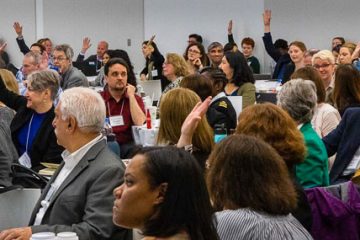
Since 2012, PRB has worked in partnership with the U.S. Census Bureau to increase knowledge and use of American Community Survey data by establishing and maintaining an ACS Data Users Group and Online Community of more than 2,000 members.
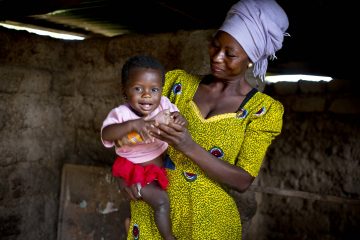
PRB leads this USAID-funded program supporting improvements in voluntary family planning and reproductive health activities, providing health and cost benefits to USAID priority countries. (Photo: Kate Holt/MCSP)
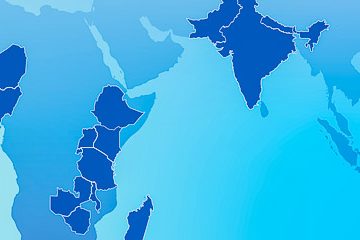
Working with local partners PRB builds champions, bridges sectors, and distills evidence to ensure that family planning, reproductive health, and population issues are recognized as key to sustainable and equitable economic growth and development.

We moderate the Interagency Gender Working Group (IGWG) website and listserv, co-chair the Gender-Based Violence (GBV) Task Force, and edit and produce print and multimedia materials that guide gender communities of practice globally. As a GBV Task Force co-chair, PRB organizes events that apprise development experts of new research and best practices on a wide range of GBV issues, including child marriage, female genital mutilation/cutting, and sex selection at birth.

